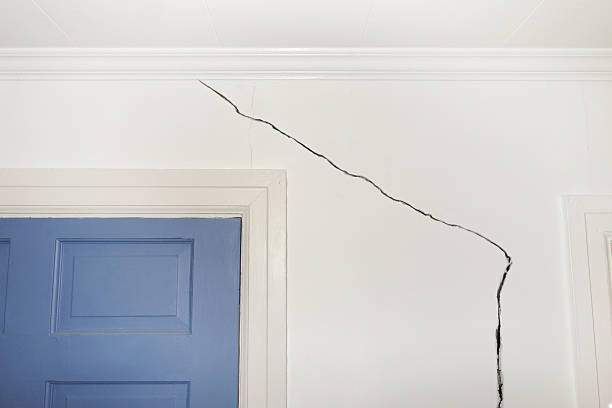
Reasons for house to crack.
Cracking in a house can be a major concern for homeowners, and it’s important to understand the underlying causes to prevent further damage. Juspropa Builders will discuss the common causes of house cracking in South Africa and provide tips on how to prevent it from happening.
Soil movement
Soil movement is one of the most common causes of house cracking in South Africa. This can occur due to changes in the moisture content of the soil, which can cause it to expand or contract. This movement can put pressure on the foundation of the home, causing it to crack. This can also occur if the soil is poorly compacted before construction, which can cause the foundation to settle unevenly over time.
To prevent soil movement, ensure that the soil around your home is properly compacted before construction begins. Additionally, ensure proper drainage around your home to prevent water from pooling near the foundation, which can cause the soil to expand.
Structural issues
Structural issues such as insufficient support or inadequate reinforcement can cause cracking in the walls or floors of a home. This can occur due to poor construction practices, substandard materials, or improper design. Book an architect now
To prevent structural issues, work with reputable contractors who use high-quality materials and follow proper construction practices. Additionally, avoid making structural changes without consulting a professional.
Water damage
Water damage is another common cause of house cracking in South Africa. Water can seep into the walls or floors of a home and cause them to weaken or swell. This can cause the foundation to shift and crack over time.
To prevent water damage, ensure that your home is properly waterproofed and that there are no leaks in the plumbing system. Regularly inspect your home for signs of water damage, such as dampness or mold, and address any issues as soon as they are identified.
Natural disasters
Natural disasters such as earthquakes, floods, and strong winds can also cause cracking in a home. These events can cause the foundation to shift and crack or can damage the walls and floors directly.
To prevent damage from natural disasters, consider installing seismic retrofitting or reinforcing the structure of your home. Additionally, ensure that your home is properly insured to protect against damage from natural disasters.
If you notice cracks forming in the walls or floors of your home, it’s important to have them inspected by a professional to determine the underlying cause and prevent further damage. Juspropa House Inspectors who work with building insurance like FNB can provide a thorough inspection and recommend the best course of action to repair any damage and prevent future cracking. Don’t hesitate to contact us for assistance with your home repairs.
What can you do to prevent house cracking?
House cracking can be a serious problem that can lead to costly repairs and compromise the structural integrity of your home. Fortunately, there are several steps you can take to prevent house cracking. In this article, Juspropa Builders we’ll discuss some of the most effective strategies for preventing house cracking.
Properly prepare the soil before construction
One of the most common causes of house cracking is soil movement, which occurs when the soil beneath a home expands or contracts due to changes in moisture content. This can put pressure on the foundation of the home and cause it to crack. To prevent soil movement, it’s important to properly prepare the soil before construction begins. This involves compacting the soil to ensure it is stable and won’t shift over time.
Install proper drainage around your home
Proper drainage is also essential for preventing house cracking. Water that pools around the foundation of a home can cause the soil to shift and put pressure on the foundation, leading to cracking. To prevent this, ensure that your home is equipped with proper drainage systems, such as gutters and downspouts, that direct water away from the foundation.
Maintain consistent moisture levels in the soil
As we mentioned earlier, changes in moisture content can cause the soil beneath a home to expand or contract, which can lead to cracking. To prevent this, it’s important to maintain consistent moisture levels in the soil around your home. This can be achieved by watering the soil regularly during dry periods and avoiding overwatering during periods of heavy rain.
Use high-quality construction materials
Using high-quality construction materials is essential for preventing house cracking. Substandard materials can weaken the structural integrity of a home and make it more susceptible to cracking. When building or renovating a home, be sure to work with reputable contractors like Juspropa who use high-quality materials and follow proper construction practices.
Regularly inspect your home for signs of cracking
Finally, it’s important to regularly inspect your home for signs of cracking. This includes checking the walls, floors, and foundation for any visible cracks or signs of damage. If you notice any issues, it’s important to have them addressed as soon as possible to prevent further damage.
By following these strategies, you can help prevent house cracking and protect the structural integrity of your home. If you do notice any signs of cracking, be sure to contact a professional for an inspection and to address any issues as soon as possible.

